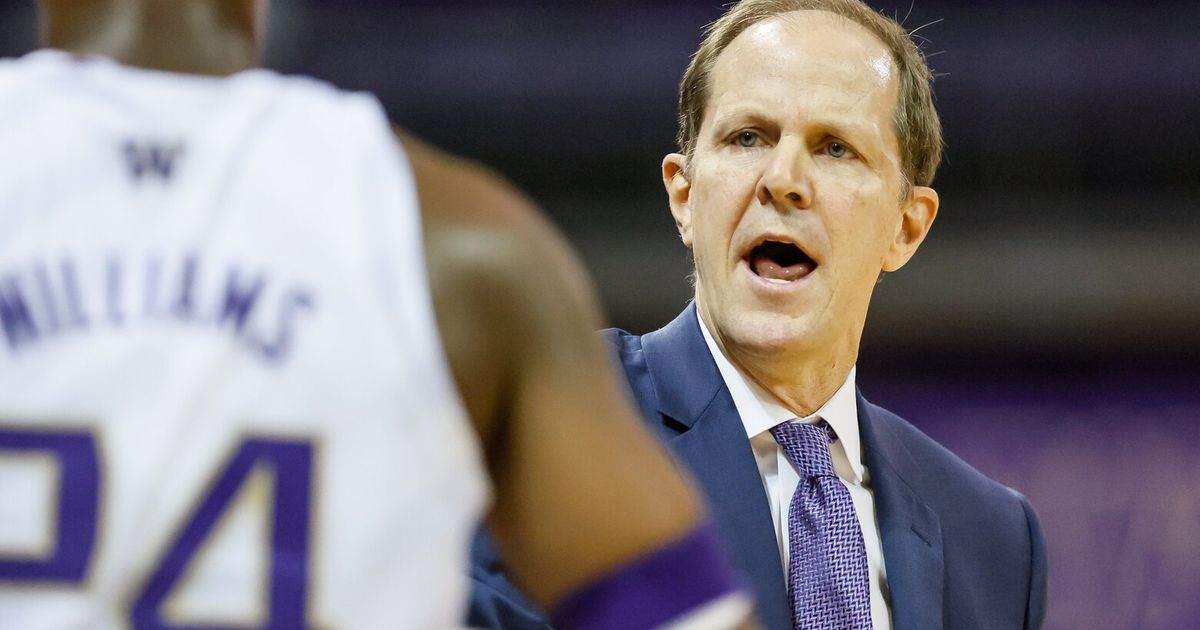
To a man, the Huskies bemoan a string of slow starts that have characterized the Washington men’s basketball season as much as the rash of injuries that’s thinned the roster, the development of a handful of newcomers, a surprising holiday tournament win and a pair of embarrassing nonconference losses.
“We have to find a way to do a better job in the first half and not put ourselves in such a deficit early on,” coach Mike Hopkins said following a 66-65 loss at Oregon State in which UW trailed 38-26 at halftime and went scoreless for 7:45 minutes in the first half. “Right now, I don’t know what that means in terms of who’s starting or rotations or things like that. We just need more energy and attention to detail. … We’ll figure it out and get it fixed. I’m sure of that.”
It’s not fixed.
Heading into Saturday’s 7 p.m. nonconference game against Idaho State (3-8), Washington (8-3, 1-1 Pac-12) has trailed at halftime in eight games.
Hopkins knows the Huskies are living dangerously just as they did Tuesday when they were down 15 points against Cal Poly in the first half before relying on a 50-point explosion in the second half — the most points they’ve scored in a half this season — led to a stunning comeback 74-68 victory.
“We’re just not coming out ready to play,” senior forward Keion Brooks Jr. said. “They came in and hit us and we kind of fell back a little bit. We got to come out with more energy to start the game and with more attention to detail. We got to be ready to fight. You got to fight like a lion out there and be ready to take the hits and keep moving.”
Cole Bajema added: “Obviously, we don’t want to have the starts like that, but credit to them, they hit us right from the start. But we fought back. That’s just the team we are. Our message: We try to be tougher together always. We fought back in the second half and we made things happen.”
Brooks and Bajema were part of the problem and the biggest reason why UW averted disaster in their last outing. Hopkins pinned the slow start on Husky starters who were chiefly responsible for Cal Poly’s 25-10 lead with 11:08 left in the first half.
In the second half, Brooks made amends while pouring in 23 of his career-high 30 points. After the break, he connected on eight of 10 shots, including two three-pointers and was five of six on free throws in 20 minutes.
Meanwhile, Bajema, who didn’t attempt a shot in the first half, scored 11 of his 13 points after the break and never left the floor.
“I didn’t play a lot of guys in the second half,” said Hopkins who essentially relied on lineup including PJ Fuller II, Keyon Menifield, Braxton Meah, Brooks and Bajema. “I told the guys, I just want five tough guys. I don’t know what’s going to happen, but we have to play harder and have to compete harder. We have to compete on the defensive end.
“Everybody is worried about their offense. We just got to compete. Those guys did it. They found a way and we’re happy that we came out and won with a lot of lessons to be learned.”
Well, that remains to be seen.
The cardiac Huskies seem hellbent on putting themselves in precarious situations before scrambling in the final minutes to claim a victory that was seemingly harder than it should have been.
Washington followed that script against Fresno State, Seattle University, Utah Tech and North Florida.
Next up is an underperforming Idaho State team that’s compiled a 10-31 record the past two seasons. UW is 5-0 all time against the Bengals, including an 85-66 win in their last meeting on Dec. 14, 2013.
The Huskies are a 16½-point favorite, according to Las Vegas oddsmakers in what’s considered the last tuneup before the schedule gets increasingly difficult.
Washington hosts No. 19 Auburn on Wednesday before resuming the Pac-12 schedule with daunting four-game ** that includes home games against USC and No. 16 UCLA as well a road trip to No. 9 Arizona and Arizona State.
“This team has been very resilient all year,” Hopkins said. “We’ve been down. We’ve had highs and we’ve had lows, but we’ve been resilient. That’s the one thing.”